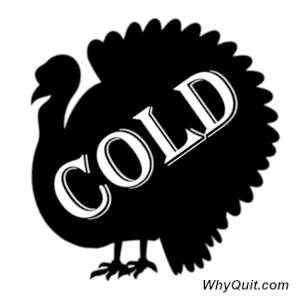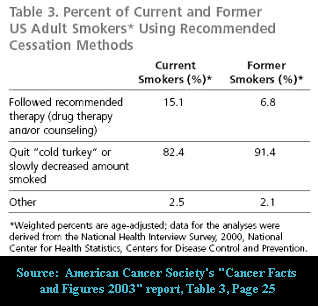
How do most smokers quit?

Which quit smoking method produces more ex-smokers than all others?
According to a 2020 U.S. Surgeon General report entitled “Smoking Cessation,” the correct answer is “cold turkey” … “that most smokers who quit successfully do so without medications or any type of formal assistance” and "that cold-turkey quitters do as well or better than those who use over-the-counter NRTs” (see page 15).
Merriam-Webster defines “cold turkey” as “abrupt complete cessation of the use of an addictive drug.”
According to the FDA, “nicotine is a highly addictive chemical compound present in a tobacco plant” and “all tobacco products contain nicotine.”
Thus, switching from smoking cigarettes to inhaling vaped nicotine from e-cigarettes, or the use of replacement nicotine weaning products (NRT), does not fit the definition of quitting cold turkey.
What does fit is abruptly ending nicotine use after being strongly encouraged to quit by your doctor, after getting sick and going a few days without, while reading a quitting book, receiving formal counseling, participating in a support group, or while standing on your head.
What percentage of ex-smokers quit cold turkey?
First, despite surveys being relatively inexpensive to conduct, understand that detailed snapshots of cold turkey's contribution to the real-world quitting picture are rare. It's not by accident. I'll explain why in a minute.
It's why the 2020 Surgeon General's report is so important. Although reluctantly, at last, the giant turkey in the room is getting noticed and mentioned.
A 2013 U.S. Gallup Poll asked successful ex-smokers the open-ended question, “Trying to be as specific as possible, what strategies or methods for quitting smoking were the most effective for you?”
While 48% responded that they just quit, decided it was time, or quit cold turkey, an additional 23% (71% total) may have met the definition of cold turkey in that they credited willpower, commitment, mind over matter, support from family or friends, prayer, that they were experiencing health issues related to smoking, or that they stopped being around smokers.
Interestingly, only 5% credited the nicotine patch, 2% prescription drugs, 1% nicotine gum, and 2% gradually cut down.
The Gallup Poll's cold turkey finding is relatively consistent with a 2011 study that included “cold turkey” among the survey's 13 listed quitting methods. There, among 1,097 smokers who had quit within the past year, 738 or 69% had quit cold turkey.

A 2006 Australian study examined the records of smoking patients. Among patients who had successfully quit, cold turkey accounted for 1,942 of 2,207 ex-smokers or 88% of all success stories. It also found that cold turkey was at least twice as effective as the nicotine patch, gum, inhaler, or Zyban.
Why is how most smokers quit treated as "top secret"?
So, you've noticed. I challenge anyone to locate on any government or health organization website encouraging use of NRT, Chantix or e-cigarettes, an answer to the question “How did most successful ex-smokers quit?”
Shockingly, the answer to the most basic quitting question of all simply isn't there. But why?
Think about it this way, if more smokers quit smoking cold turkey than by all other quitting methods combined, who is the quitting product industry's #1 enemy? The next time you watch a Nicorette or Chantix commercial, notice how it discourages smokers from quitting cold turkey.
Cold turkey can't fight back. It has no voice or bank account. It doesn't make commercials.
Unlike the pharmaceutical industry, it hasn't paid “PhD industry” professors consulting or speaking fees, it hasn't funded a single quitting study, and it has no employees who ascend to key smoking cessation government leadership roles.
While most successful quitters find quitting easier than expected, the industry needs and has conditioned smokers to believe that quitting is super hard and that quitting without purchase and use of approved products is nearly impossible.
Unfortunately, pharma's influence over national quitting method surveys has been substantial. Today, cold turkey quitting questions are almost never asked. Redefine and conquer, one of the earliest examples of cancel culture, nearly all surveys totally ignore cold turkey quitters.
Instead, a cold turkey quitter reading a cold turkey quitting book or joining a cold turkey support group is classified as an “assisted” or counseled quitter, while if quitting on their own they are lumped with “unassisted” quitters, including all engaged in significantly less effective gradual cigarette weaning schemes.
The neo-nicotine industry's grip upon medicalized smoking cessation is omnipresent. It's why it's highly unlikely that any future quitting survey will ask the question, “During your most recent quit attempt, did you abruptly and completely end all nicotine use?”
Fair, honest, accurate, complete, annual, and available real-world nicotine dependency recovery method pictures would make it harder to sell approved quitting products or e-cigarettes. If noticed and featured, profits could plunge.
It would also make it unfair and highly deceptive to make commercials or quitting booklets (see page 10) suggesting that quitting cold turkey is super hard and that "not many" are able to quit this way.
An in-your-face example of pharma's tremendous influence is the U.S. government's SmokeFree.gov quitting site. The site reviews 13 quitting methods including Nicorette, Nicotrol, Nicoderm and Chantix. Guess which method isn't listed? You guessed it, the nation's most productive.
In fact, while there, type “cold turkey” into the website's search window located at the upper right corner of the page. Now click search. Talk about cancel culture, the results state, “Your search yielded no results.”
The key to cold turkey
Nicotine's 2-hour elimination half-life guarantees that within 72 hours of ending all nicotine use that the recovering smoker's body will become 100% nicotine-free, that their brain will have no choice but to begin the process of restoring natural neuronal sensitivities, and that peak withdrawal is by then behind them.
After that, it's all about relapse prevention, simply taking recovery one day or challenge (if any) at a time. But know this. Nicotine addiction is real drug addiction. Just one puff and within seconds up to 50% of brain dopamine pathway receptors would become occupied by nicotine.
While nearly a billion ex-smokers are super comfortable inhabitants of Easy Street, they remain on probation for the balance of life. They are just one puff away from awakening their arrested dependency, from having their dopamine pathways return to functioning as if inhaling nicotine is as core to their survival as eating food.
There's only one rule. While one puff will always be too many and thousands not enough, it's impossible to fail so long as all nicotine stays on the outside. Yes, just one rule … to Never Take Another Puff!
 John R. Polito received his JD from the University of South Carolina School of Law in 1985, where he graduated Wig & Robe. He is a former 3-pack-a-day thirty-year smoker and the 1999 founder of WhyQuit. A nicotine cessation educator since 2000, John mentored under Joel Spitzer for two decades, presenting more than 100 live nicotine dependency recovery programs modeled after Joel's programs. He is the author of "Freedom from Nicotine - The Journey Home," "Smart Turkey," and 6 peer-reviewed journal articles. John is the founder and director of Turkeyville, a 15,000-member Facebook support group exclusively for cold turkey quitters. Email: johnpolito54@gmail.com
John R. Polito received his JD from the University of South Carolina School of Law in 1985, where he graduated Wig & Robe. He is a former 3-pack-a-day thirty-year smoker and the 1999 founder of WhyQuit. A nicotine cessation educator since 2000, John mentored under Joel Spitzer for two decades, presenting more than 100 live nicotine dependency recovery programs modeled after Joel's programs. He is the author of "Freedom from Nicotine - The Journey Home," "Smart Turkey," and 6 peer-reviewed journal articles. John is the founder and director of Turkeyville, a 15,000-member Facebook support group exclusively for cold turkey quitters. Email: johnpolito54@gmail.com

